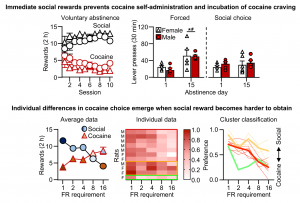 Hot Off the Press – August 24, 2021
Hot Off the Press – August 24, 2021
In humans who use addictive drugs, social-reinforcement-based treatments can protect against drug use and relapse, but not in all patients. We used a new operant rat model that mimics features of one such treatment, the community-reinforcement approach; having previously shown that rats choose social reinforcement over heroin or methamphetamine, we extended the procedure to cocaine. Additionally, we delayed the social reward, or increased the effort to obtain it, to elicit interindividual variability in responding. We show that operant social interaction protects against continued cocaine taking and seeking in male and female rats in two addiction models: escalation and intermittent-access drug self-administration. We also showed that individual differences in cocaine versus social reward choice emerge by increasing the delay for both rewards or social reward alone, or the response requirements (effort) to obtain the social reward. This human-relevant choice procedure can be used to identify mechanisms of individual differences in addiction vulnerability and to identify medications for people who benefit less from the protective effect of rewarding social interaction on addiction.
Publication Information
In: Neuropsychopharmacology, 2021, ISBN: 1740-634X.
